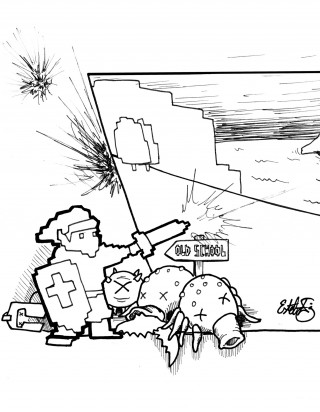Worshipping the Gilded Game at the 8-Bit Altar.

Editor’s Note: This submission comes from Chad Thomas Johnston, who describes himself as “an author, sonuva‘ preacha‘ man, PhD-dropout, daydreaming doodler, singer/songwriter, publicist, PUN-isher, mixtape maker, & pop-culture junkie.” He operates the Twitter account @Saint_Upid and the website chadthomasjohnston.com.
By Chad Thomas Johnston
Guest Contributor
Growing up in the church as the son of a minister, I met several “church bullies” along the way — people who picked on me one minute and paused for a moment of holy reflection when anyone mentioned the words God, Jesus, or Bible. I never liked these people. Since they always picked on me, I suspect they never liked me much either.
When it comes to video games, I assume a similar role to that of the church bully. I have long made fun of my gaming friends —in a rib-poking, eye-winking way, of course.
But when anyone mentions Nintendo’s original “Legend of Zelda” from 1987, I pause for a moment of pious reflection and worship at the 8-bit altar. Once the fog of quasi-religious fervor evaporates, I return to persecuting my video gaming brethren for playing “World of Warcraft” in their skivvies.
Sure, my wife Becki and I own a Nintendo Wii, and I am fond of the “Mario Brothers,” too. But I am hardly a fanatic. My wife is the gamer in our family, and it was her will for us to have a Wii.
I was only open to owning a Wii because I grew up with video games in my home. There was “Burger Time” on the Texas Instruments computer, a series of text-driven games a la “Zork” on the Tandy 1000 (with its cassette-tape drive that begged the question “Do we listen to data or Duran Duran?”). Over the years, we picked up Atari and Coleco gaming systems at garage sales (although the Coleco may have actually been a Commodore 64). These games and gaming systems were voices in the digital wilderness of my youth—John the Baptists preparing the way for The Legend of Zelda.
In 1987, or perhaps 1988, my parents bought my sister Alyssa and me a Nintendo Entertainment System (NES) and The Legend of Zelda along with it. Perhaps they were trying to atone for the Christmas when they gave us nothing but board games.
The cartridge for “Zelda” was made of metallic gold plastic, and it was like the Ark of the Covenant in “Raiders of the Lost Ark.” The gilded exterior could inspire want in a man, but the real, face-melting razzle-dazzle was inside.
Dad and I were dazzled by “Zelda” for the better part of 1988. As father and son, we played the part of the heroic Link, waging war against Ganon’s minions in the land of Hyrule without the benefit of the Internet’s walkthroughs. We wandered Hyrule with only the map that came with the game. It yielded few secrets, so playing the game was always something of a Lewis and Clark expedition for us. We clutched the NES controllers tightly in trepidation as we forged onward.
It took Dad and I six months to conquer the game. During that time, I memorized the names of Hyrule’s inhabitants with savant-like accuracy.
Upon repurchasing the original NES “Zelda” for the Wii’s Virtual Console sometime last year, I was pleased to discover I still remembered the names of many of Link’s enemies: Moblins, Tektites, Octoroks, Peahats, Wizrobes and Leevers, to name a few.
Even more, the world of Hyrule itself was a place I remembered. Revisiting it reminded me of last year when Becki and I drove through Odessa, Miss., where I spent a substantial portion of my childhood. Despite the fact that I had not visited my boyhood home in more than 15 years, I was able to lead us directly to it.
In more ways than one, home is at the heart of my love for“The Legend of Zelda.” It remains the game I played with my dad. While most fathers and sons seem to enjoy throwing the old baseball around in the yard, my dad and I preferred to throw the old broadsword around in the land of Hyrule.
It amazed me that my dad—a pastor who could read Greek, marry the living and bury the dead—would stoop to the level of a child and play video games with me. As I see it, this is the picture of the very gospel he continues to preach. That God, who could yawn universes into being, would choose to stoop and become a man so we might know him is at the heart of the Christian narrative.
Now that I have paused for a moment of pious reflection, I must deliver cruel remarks to my video-game playing friends. A bully’s work is never really done. Even in “Zelda,” when you beat the game, a second quest begins. One’s sword should never rest for too long, as I am sure Link would agree.



